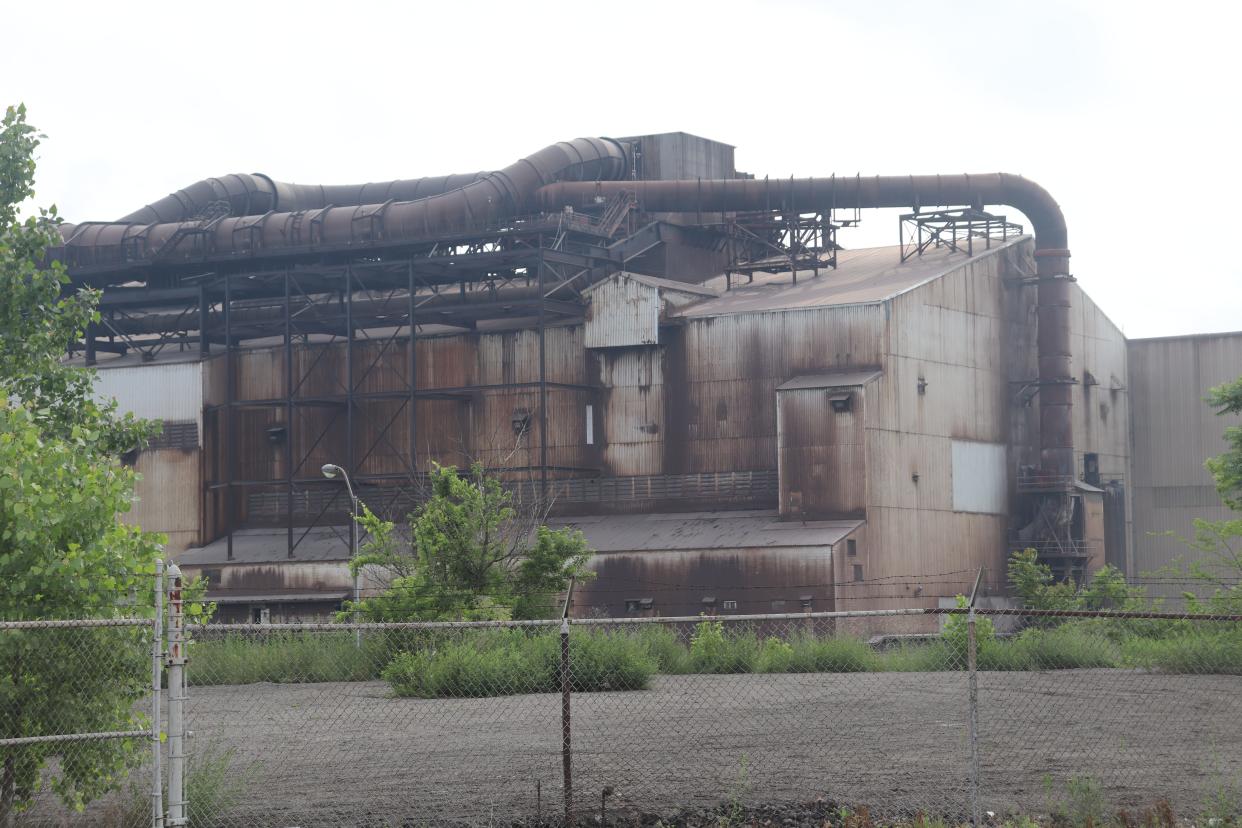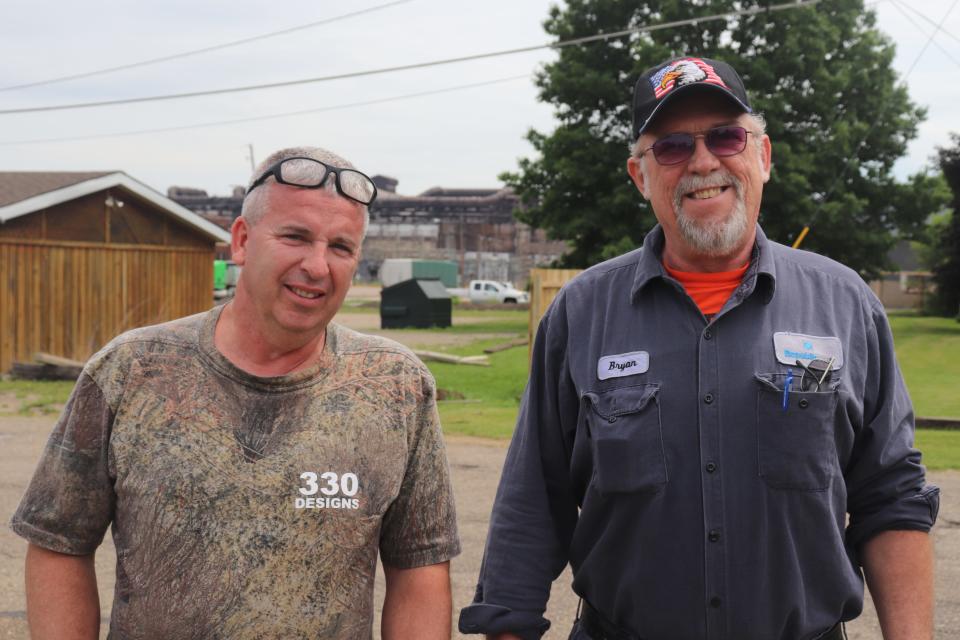The 'inherently dirty' process of making leaded steel in Canton

CANTON – For years, decades even, residents near Republic Steel say they've been concerned about dust and dirt spewed from the plant.
Republic's use of lead has become a particular point of contention. The factory in Canton, where company headquarters are located, faces ongoing scrutiny from environmental protection agencies related to leaded steel production and emissions.
Canton Health Commissioner James Adams said the installation of two air monitors along Marietta Avenue NE will begin in the coming week. They were announced at a public meeting in November and supplement a Georgetown Road NE monitor that's operated since 2017.
"We were basically waiting for the weather to cooperate," Adams wrote in an email.
Canton City Public Health also recently coordinated blood lead testing for residents, and results showed no elevated levels among the 19 adults who participated. A public health consultation based on existing data is ongoing at the Ohio Department of Health.
Steel is an alloy primarily made of iron and carbon. So what is the purpose and process of adding lead?
Lead exposure concerns: Blood test results for residents near Republic Steel show 'good news'
Republic Steel: Health, environmental officials address actions

A malleable, valuable metal
Lead is a soft metal used to make a more malleable, type of free-machining steel.
"So it won't break when it's being machined at a high speed," said Todd Fitzgibbon, president of United Steelworkers Local 1200 — which represents about 220 workers at Republic Steel, located at 2633 Eighth St NE.
Fitzgibbon said a small percentage of lead goes into 12L14 steel that is shipped to factories in Lackawanna, New York, or Lorain to be turned into coil or bars. Leaded steel is sold to companies that create bearings, couplings, hydraulic fittings and other products.

"Just about every vehicle that moves probably has hydraulic hose fittings on it," said Bryan Rice, the union's vice president.
Although researchers at the University of Pittsburgh reported tin as a promising alternative to lead in 1999, the use of leaded steel continues.
"It's hard to replace lead because of the machinability," Fitzgibbon said. "There's no other metals that will replace it. Nothing even compares to it."
The price of leaded steel also is about "three times higher" than other alloys.
"The cost to make it is about the same, but the cleanup cost is a lot higher," Fitzgibbon said.
According to the Ohio EPA, the Canton plant is the only active manufacturer of leaded steel in the state. Republic's plant in Lorain has a permit to produce leaded steel but currently is not.

The American Iron and Steel Institute doesn't keep data specific to leaded steel, according to Lisa Harrison, senior vice president of communications. Nor is Republic a member of the trade association.
Rob Koury, executive vice president and COO of Republic Steel, did not respond to emails seeking comment for this article.
'Underappreciated' air pollutant
Lead is an element found in the earth's crust that has been used — and also phased out — by various industries. It can have harmful effects on the body, and young children especially are susceptible to brain and nervous system damage.
James Fabisiak, associate professor with the Department of Environmental and Occupational Health at the University of Pittsburgh's Graduate School of Public Health, said there's no "safe dose" of lead.
"I think that maybe lead is actually a little bit underappreciated as a problem as it relates to air pollution," he said. "You know, we certainly hear more, bigger discussions had over those pollutants that are more widespread like PM 2.5 (fine particulate matter) or nitrogen dioxide in 2.5 can come from any variety of industries really."

The Republic Steel plant in Canton released the most lead compounds in 2020 out of 143 companies capable of producing lead or lead compounds statewide, according to data from the U.S. EPA's Toxics Release Inventory. The factory emitted 2,415 pounds of lead compounds into the air — 53.2% of its total chemical air releases.
There are 1,825 companies capable of releasing lead or lead compounds nationwide, according to the U.S. EPA. Republic Steel in Canton ranks ninth for the most lead or lead compounds released.
However, the Toxics Release Inventory (TRI) is not all-encompassing.
"It is important to keep in mind that TRI does not cover all facilities, all toxic chemicals, or all sources of TRI chemicals in communities. For example, potential sources of chemical exposure that are not covered by TRI include exhaust from cars and trucks, chemicals in consumer products, and chemical residues in food and water," Jennifer Beese, a spokeswoman for the U.S. EPA, wrote in an email.
Facilities are given a potential risk score based on the amount and toxicity of chemicals released, how the chemicals move through the environment, and the total population potentially exposed.
United Rolls, a factory just northwest of Republic Steel, has the highest potential risk score in Canton, whereas Republic Steel is sixth despite having more total releases (air, water, land and off-site) and more violations than United Rolls. There are 132,244 people within a 5-mile radius of United Rolls and 121,430 surrounding Republic Steel.
"The difference in scores between the facilities could be caused by any number of factors, including the toxicity of the chemicals being released by each facility, or the number of people the model estimates could potentially be exposed," Beese stated.
She added that potential risk scores should "only be used as a potential starting point to identify situations of potential concern that may warrant further investigation."

ProPublica, a nonprofit news organization, recently highlighted inaccuracies in the TRI pollution data that largely is self-reported by companies and based on estimations.
"There are no studies on the overall reliability of the Toxics Release Inventory, but over the decades, researchers have documented concerns that industrial emissions may be severely underestimated," according to the report.
However, ProPublica's report also states that "it remains the most comprehensive, readily available source of industrial air pollution data in the country." The EPA, in response, has announced a new Pollution Accountability Team to improve monitoring.
ProPublica: EPA Takes Action to Combat Industrial Air Pollution
'There's nothing that's healthy about making steel'
Republic Steel uses an electric arc furnace to re-melt scrap steel rather than start with raw materials in Canton. That method accounts for more than 70% of steel production in the United States, according to the American Iron and Steel Institute.
In addition to lead, other hazardous materials like chromium and magnesium are used to make steel. Rice said the process is "inherently dirty."
"Everything making steel's toxic," he said. "There's nothing that's healthy about making steel."
Workers wear respirators during their shifts, which can be up to 12 hours long, and have to pass through an air curtain before eating. Uniforms are removed after work and put in plastic bags to be washed separately.
"Then, every 12 heats we run, we have to do what they call a general cleaning," Fitzgibbon said.
The Occupational Safety and Health Administration requires employers like Republic Steel to monitor blood lead levels and temporarily remove workers who exceed OSHA's blood lead standard. But there is no requirement for employers to report elevated blood lead levels to OSHA or the Ohio Department of Health (ODH), according to spokesmen for the agencies.
Clinical laboratories must send results to ODH for people who are 16 or older, but the person's place of employment is not always listed, according to ODH spokesman Ken Gordon. The state department received blood lead results for two Republic Steel workers within the last five years but did not provide The Canton Repository with the micrograms of lead per deciliter of blood.
"There’s no statute or rule administered by ODH that sets a standard of 'elevated' blood lead levels in individuals over the age of 16," Gordon wrote. "Therefore, we cannot comment on whether specific individuals fall within levels that would be 'elevated.'"
The state requires health care providers to administer blood lead tests to children up to age six.
In October, the Centers for Disease Control and Prevention lowered the blood lead threshold considered high for children from 5 to 3.5 micrograms per deciliter. The change was recommended by a federal advisory committee to better identify children exposed to lead and lessen their health risks.
Fabisiak said that's an example of how health and environmental standards evolve. The professor also noted that it's difficult to connect health effects to environmental exposure. Cancer clusters — which the city found no evidence of in 2017 — are "notoriously hard" to prove because of how long it takes cancer to develop.
"Also, I wouldn't necessarily think of lead as something that would be driving a cancer risk in air pollution," Fabisiak said. "There could be other hazardous air pollutants that perhaps come from the same factory, perhaps come from other factors."
Asthma would be the most obvious health effect triggered or worsened by air pollution, he said. Lead in the air also could be compounded by other potential lead sources, such as water pipes.
"Lead can still remain an issue in sort of very localized areas that have a source that contributes lead," Fabisiak said. "And I think that you indeed have a source that, you know, they're using lead in the manufacture of steel. We don't have that many sources like that throughout the country, but that doesn't take away from the fact that you have an industry that is still using lead to some extent and needs to be careful about that."
Summary of EPA actions
Ohio Attorney General Dave Yost, on behalf of the Ohio Environmental Protection Agency, filed for an injunction in 2021 after Republic Steel surpassed national lead emission standards for the third time in four years. Leaded steel production was temporarily halted soon after because the plant exceeded stricter emission limits set by a court order.
Republic Steel has since operated under the agreed-upon terms in the 2021 court order.
The U.S. EPA took its own action in November by citing Republic Steel for lead air pollution in an "overburdened community" — a minority, low-income or indigenous area that might face disproportionate environmental health effects. Region 5 Administrator Debra Shore stated: "EPA will work with the State of Ohio to enforce the Clean Air Act and protect the health of Canton residents, many of whom have been overburdened by pollution for far too long."
This article originally appeared on The Repository: Republic Steel is the only manufacturer of leaded steel in Ohio
